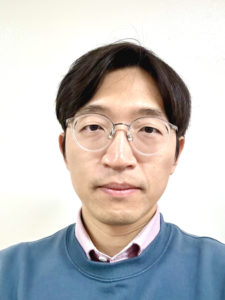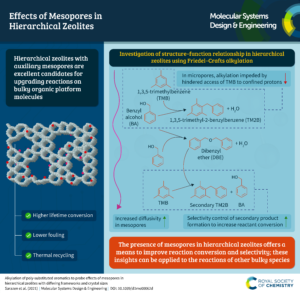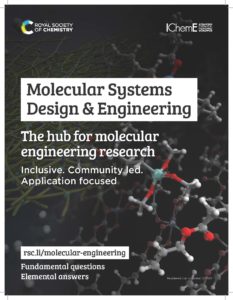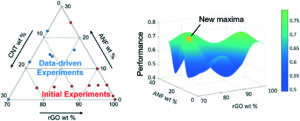It is with our great pleasure to announce Prof. Hyungwoo Kim & Prof. Won Seok Chi (Chonnam National University, Korea) as the joint winners of the 2023 Molecular Systems Design & Engineering Outstanding Early-Career Paper Award.
This is in recognition of her leadership of the paper, ‘Tailoring 6FDA-based click cross-linked membranes: modular synthesis and tunable gas separation’, DOI: 10.1039/D2ME00215A
Check out this bespoke infographic summarising the paper;
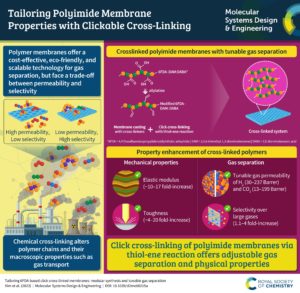
About the winners:
Check out our interview with Professor’s Kim & Chi below:
Can you briefly summarise your paper?
This paper describes rationally designed click-crosslinked 6FDA-DAM:DABA membranes using a thiol-ene cross-linking method for tunable molecular separation performance. The systematically controlled thiol cross-linkers were introduced to engineer the d-spacing and fractional free volume of click-crosslinked polymer membranes. As a result, the gas transport properties of the modular engineered click-crosslinked membranes were finely controlled depending on the thiol cross-linker. Moreover, the click-crosslinked membranes showed enhanced plasticization resistance depending on the crosslinker chain length or cross-linkable site numbers.
What aspect of your work are you most excited about at the moment?
Chi – My work focuses on functional polymer membranes and metal-organic framework (MOF) mixed-matrix membranes (MMMs) for gas separation. In particular, the rational design of the functional polymer membranes and the engineered MOF-polymer interface of the MMM can achieve significantly enhanced gas transport properties. In addition, the increased polymer chain rigidity of the polymer-based membranes can suppress the plasticization phenomenon, which is a critical issue of membrane-based separation in the industrial field.
Kim – I am conducting research on designing functional polymer materials in the field of polymer synthesis. It is very rewarding to see polymers specifically designed at the molecular level functioning as a useful material.
Where do you see the field of cross-linked membranes in five years’ time?
The cross-linking approach for polymer membranes can engineer the d-spacing of polymer membranes and reduce the polymer chain mobility. The fine-tuning of the fractional free volume of polymer membranes can be achieved showing their tunable gas transport properties. In addition, the cross-linked polymer membranes can suppress the plasticization behavior, which results in the polymer chain relaxation at highly soluble gas feed pressure, by forming a rigid polymer network from the cross-linking.
How do you feel about Molecular Systems Design & Engineering as a place to publish research on this topic?
MSDE focuses on the research work on the molecular engineering of the chemical structure of polymer materials and their corresponding transport properties. This work provides a deep understanding of the principle structure-to-transport relationship, thereby achieving a highly efficient and stable gas separation performance for industrial applications.
How do you like to spend your time when not doing research?
Chi – I enjoy taking a walk and watching a movie. Sometimes, I also enjoy traveling to rural places and abroad and hiking national parks.
Kim – I love spending time with my family. We like cooking and traveling together. Also, I like listening to all kinds of music and visiting art museums
Can you share one piece of career-related advice for those beginning their research career?
Chi – Provide abundant assistance and support for collaborators, and then it will fulfill your research as well. This work was also performed by the collaboration.
Kim – I agree to the Chi’s comment. Sometimes research can be tedious but together you can go further.
Read the paper for FREE until 29th Arpil 2024!
Tailoring 6FDA-based click cross-linked membranes: modular synthesis and tunable gas separation
Jieun Park, Chang Oh Lee, Ki Jung Kim, Won Seok Chi* & Hyungwoo Kim*
Mol. Syst. Des. Eng., 2023, 8, 32-38, DOI: 10.1039/D2ME00215A
About the award
The aim of the Molecular Systems Design & Engineering Outstanding Early-Career Paper Award is to recognise a researcher in the earlier stages of their research career for their leadership in reporting original research published in the journal.
The journal Editorial Board award this prize annually, selecting the paper which they find to demonstrate the highest quality of research, as well as importance to the advancement of the field of molecular engineering, out of all qualifying papers published in the journal each year.
Eligibility
In order to be eligible for this award, the candidate must:
|
 |
Selection Process
To choose the winner of the 2023 Molecular Systems Design & Engineering Outstanding Early-Career Paper Award, a shortlist of eligible articles that were published throughout the year were selected by the editorial office and then subsequently assessed by the journal’s Editorial Board. The winner was selected based upon the significance, impact and quality of the research.
Prize
The winner of the Molecular Systems Design & Engineering Outstanding Early-Career Paper Award will receive an engraved plaque, a bespoke infographic from Impact Science for the winning paper and £500 cash award that would be used for conference travel/attendance of their choice.
To have your paper considered for the 2024 Molecular Systems Design & Engineering Outstanding Early-Career Paper Award, indicate when prompted upon submission of your revised manuscript if a corresponding author of the paper fulfils the criteria to feature in the Emerging Investigator Series. If accepted, your paper will be added to the ongoing collection and will be considered for the award. Multiple eligible authors of a winning paper will share the prize fund equally. You can contact the editors at molecularengineering-rsc@rsc.org if you have any queries.


